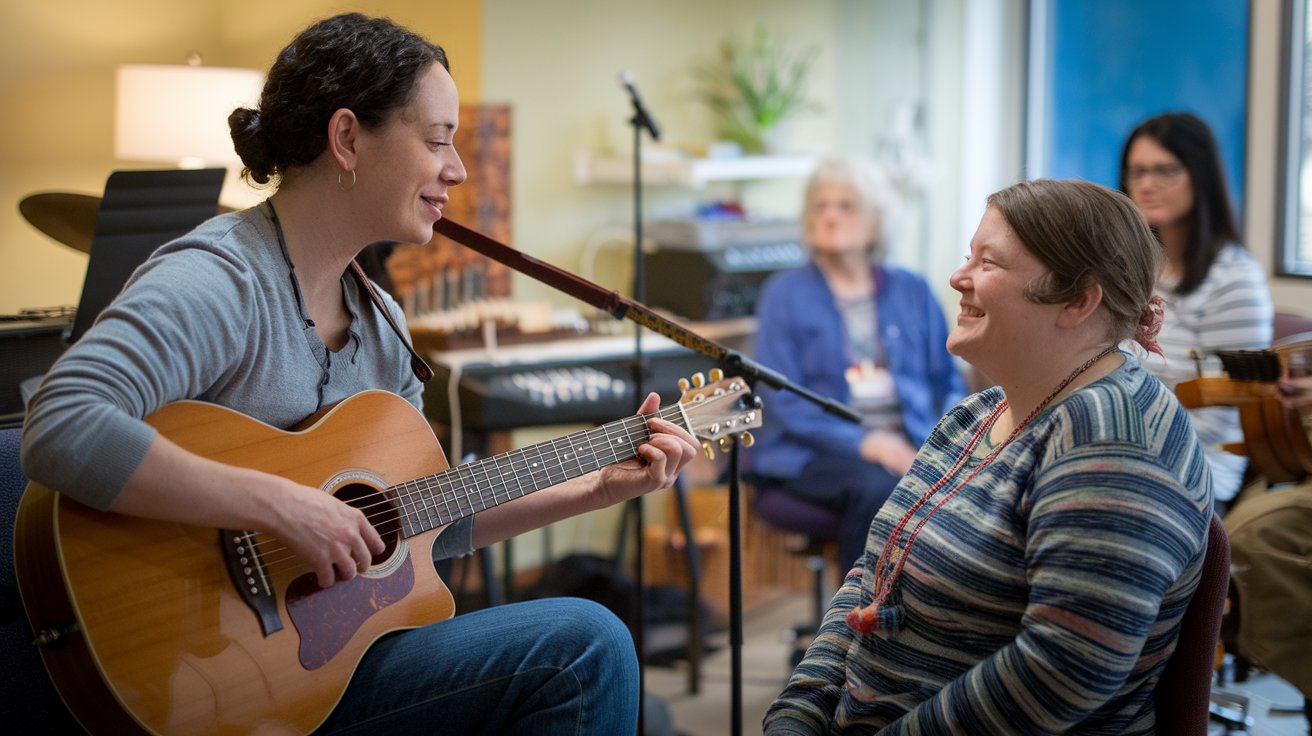Music Therapy: A Path to Mental Health Improvement
 Selja
Selja
Music therapy is a therapeutic approach that uses music to address the emotional, cognitive, and social needs of individuals. It is increasingly recognized as an effective tool for improving mental health. This article explores the foundations of music therapy, its benefits, mechanisms of action, as well as case studies and practical applications.
What is Music Therapy?
Music therapy is a form of therapy that uses music to help individuals achieve specific mental and physical health goals. It can be practiced by certified music therapists who use various musical elements such as singing, listening to music, improvisation, or composition. This therapy can be applied in various contexts, including hospitals, mental health clinics, schools, and nursing homes.
Benefits of Music Therapy
1. Emotional Expression
Music is a powerful means of emotional expression. For many, it can be easier to express complex emotions through music rather than words. Music therapy allows patients to explore their feelings using songs or by creating their own music. This can be particularly beneficial for those suffering from affective disorders or anxiety.
2. Stress and Anxiety Reduction
Studies have shown that listening to music can reduce stress and anxiety. Music therapy utilizes this property by integrating relaxation techniques with musical elements to help patients manage their stress. Sessions may include breathing exercises synchronized with calming rhythms, promoting a state of relaxation.
3. Improvement of Social Skills
Group music therapy sessions encourage social interaction. This is especially beneficial for individuals suffering from social isolation or autism spectrum disorders. Musical collaboration fosters teamwork and enhances interpersonal skills. Activities such as singing in a choir or collective music creation strengthen the sense of belonging.
4. Cognitive Stimulation
Music therapy can also stimulate cognitive functions. It helps improve memory, attention, and other cognitive abilities in individuals with neurodegenerative diseases such as Alzheimer’s or Parkinson’s. Engagement with music stimulates different areas of the brain, thereby reinforcing neural connections.
Mechanisms of Action
Music therapy works on multiple levels:
.Neurobiology: Music activates several brain areas related to emotions, memory, and reward. Brain imaging studies show that listening to music can release neurotransmitters like dopamine, which plays a key role in emotional well-being.
.Physiology: Music can influence heart rate, blood pressure, and even cortisol levels (the stress hormone) in the body. This contributes to creating a state of relaxation and reducing stress-related symptoms.
.Psychology: Music therapy fosters a safe space where individuals can explore their emotions without judgment. This therapeutic process helps develop a better understanding of oneself and strengthens self-esteem.
Clinical Applications
1. Depression
Research has shown that music therapy can be effective in treating depression. A study conducted by Bradt and Dileo (2014) revealed that patients suffering from major depression who participated in music therapy sessions experienced a significant reduction in depressive symptoms compared to those who did not receive this treatment.
Case Study: Music Therapy for Depression
In a clinical study, a group of patients suffering from depression was divided into two groups: one group received traditional therapy while the other participated in weekly music therapy sessions for eight weeks. The results showed that the group undergoing music therapy not only had a significant reduction in depressive symptoms but also an overall improvement in emotional well-being.
2. Anxiety
Music therapy is also used to treat anxiety. A meta-analysis conducted by Maratos et al. (2008) concluded that music therapy significantly reduces anxiety levels among various patient groups, including those with generalized anxiety disorder.
Case Study: Music Therapy for Anxiety
A hospital implemented a pilot program where patients suffering from severe anxiety participated in weekly music therapy sessions for three months. Results showed a significant decrease in anxiety levels measured by standardized scales before and after treatment.
3. Autism Spectrum Disorders
Children with autism spectrum disorders greatly benefit from music therapy. Studies show that it improves their social and communication skills while reducing problematic behaviors (Geretsegger et al., 2014).
Case Study: Music Therapy with Autistic Children
A study was conducted with a group of autistic children who participated in weekly music therapy sessions for six months. Results showed a notable improvement in their ability to interact with peers and express their emotions.
Methods Used in Music Therapy
Music therapy includes various techniques tailored to individual needs:
1. Active Listening
Patients actively listen to different types of music to explore their personal emotions and reflections.
2. Musical Improvisation
Patients are encouraged to create their own music, fostering personal expression and creativity.
3. Singing
Singing can be used as a powerful means of emotional expression and can also enhance the sense of belonging when practiced in groups.
4. Musical Composition
Patients may write their own songs or lyrics, allowing them to explore their personal experiences while developing creative skills.
Challenges and Limitations
While music therapy offers numerous benefits, it is not without challenges:
.Access to Services: Access to trained music therapy professionals may be limited in certain regions.
.Variability in Outcomes: Effects can vary significantly from one individual to another based on personal musical preferences and level of engagement.
.Integration into Traditional Care: It can sometimes be challenging to effectively integrate music therapy into traditional therapeutic protocols.
Future Perspectives
The future of music therapy looks promising with several potential directions:
1. Increased Research
There is a growing need for more rigorous clinical studies to evaluate the specific effectiveness of various musical interventions on different mental disorders.
2. Technological Integration
The increasing use of digital technologies could transform how music therapy is delivered, particularly through mobile applications or virtual platforms that allow patients easy access to therapeutic musical resources.
3. Professional Training
Ongoing development of educational programs to train more qualified professionals in music therapy will be crucial for expanding its accessibility and effectiveness across various clinical contexts.
Personal Testimonials
Personal testimonials can powerfully illustrate the positive impact of music therapy:
.Testimonial from a Depressed Patient: "Music therapy has allowed me to express my emotions without needing to speak directly. Each session leaves me feeling lighter; I feel heard."
Testimonial from a Parent: "My autistic child has made significant progress thanks to his sessions with his music therapist; he interacts more with us now."
Conclusion
Music therapy represents a promising approach for improving mental health through its numerous emotional, cognitive, and social benefits. By fostering personal expression and reducing stress, it provides a valuable alternative to traditional treatments for various mental conditions.
References
1. Bradt, J., & Dileo, C. (2014). Music interventions for mechanically ventilated patients: A systematic review and meta-analysis of randomized controlled trials. *Cochrane Database of Systematic Reviews*, (12).
2. Maratos, A., Gold, C., Wang, X., & Crawford, M. (2008). Music therapy for depression: A systematic review and meta-analysis of randomized controlled trials. *Cochrane Database of Systematic Reviews*, (1).
3. Geretsegger, M., Holck, U., & Rønnestad, M.H. (2014). Music therapy for children with autism spectrum disorder: A systematic review and meta-analysis of randomized controlled trials. *Journal of Autism and Developmental Disorders*, 44(5), 1097-1106.
4. Bradt J., & Dileo C., (2013). Music interventions for mechanically ventilated patients: A systematic review and meta-analysis of randomized controlled trials: *Cochrane Database of Systematic Reviews*, (12).
A simple and natural wellness secret awaits you. Click here to learn more and change your routine.
https://medicinalseedkit.com/kit/#aff=selja48
Subscribe to my newsletter
Read articles from Selja directly inside your inbox. Subscribe to the newsletter, and don't miss out.
Written by

Selja
Selja
Committed to helping you achieve optimal health through pratical and natural solutions.